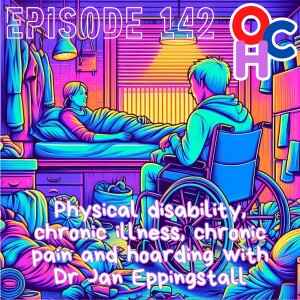
Friday May 31, 2024
#142 Physical disability, chronic illness, chronic pain and hoarding with Dr Jan Eppingstall
Come to a Dehoarding Accountability Zoom Session: http://www.overcomecompulsivehoarding.co.uk/ticket
Subscribe to the podcast: https://www.overcomecompulsivehoarding.co.uk/subscribe
Podcast show notes, links and transcript: http://www.overcomecompulsivehoarding.co.uk/
We need to talk about hoarding and physical disabilities, chronic illness, and chronic pain. With the inimitable Dr. Jan Eppingstall, I look at the unique challenges faced by individuals with disabilities, chronic health conditions who hoard. From the impact of aging on hoarding tendencies to the struggles of navigating a hoarded space while managing chronic pain, we offer insights and practical strategies for those dealing with hoarding and physical limitations. Join us as we delve into the complexities of hoarding and its intersection with physical health challenges in a compassionate and informative discussion.
- The Impact of Disabilities on Hoarding Behaviours
- Complex relationship between hoarding and disabilities
- Chronic pain, mental health issues, and aging
- The prevalence and severity of hoarding in correlation with aging and physical limitations
- The challenges of categorising people and their impairments
- Gender Disparities and Disabilities in Hoarding research
- The association between physical disabilities, chronic illness, and chronic pain with hoarding, particularly among women
- The link between autoimmune diseases, common in women, and hoarding
- The impact of poverty on disabilities and hoarding
- Advocacy challenges for women with disabilities and hoarding behaviours
- The need for women to better acknowledge their achievements without feeling like boasting
- The significance of functional impairment in the discussion
- The importance of persistently seeking medical help despite the gender pain gap and lack of specificity in symptoms
- Strategies for individuals to lead a more independent and fulfilling life despite chronic issues
- The effects of giving up on seeking medical help on documenting conditions and receiving appropriate care
- Managing Hoarding and Disabilities
- Balancing function over appearance for hoarders with chronic health problems
- The individuals' strong attachment to certain aesthetics and struggles in decluttering due to sentimental attachment
- Practical ways to seek help and simplify tasks for people with hoarding tendencies, particularly for those living alone
- Strategies for managing household tasks despite limited mobility
- The importance of pacing oneself and not pushing beyond physical limits
- The impact of spending time outdoors on mental and physical health
- Challenges of Aging and Hoarding
- Accumulation of belongings over a lifetime, particularly among older generations
- Reluctance to part with items due to sentimental attachment and difficulty decluttering with physical limitations
- The isolation and loneliness experienced by older individuals in decluttering and organising tasks
- Addressing the challenges faced by hoarders with physical limitations, including lifting, fine motor skills, and brain fog
- The impact of limited energy and the need for careful prioritisation of tasks
- Living with Physical Health Problems in a Hoarded Environment
- The physical and emotional challenges of living with physical health problems
- Managing disabilities and planning, scheduling appointments, and attending to physical needs in a hoarded space
- The increased energy consumption living in a hoarded space
- Navigating chronic pain and strategies to manage dehoarding tasks even on bad pain days
- Differentiating between tasks that move the needle and those that simply paper over the cracks
- Hoarding research shows self-selection bias towards females.
- Hoarding increases with age, affecting functionality.
- Disability requires more planning and preparation.
- Living with physical limitations is never straightforward.
- Self-compassion improved my situation.
- Avoid pushing too hard, limit activities to 3 hours.
- Hoarding and function over appearance for health.
- Assessing and adjusting belongings to create harmony.
- Study on disability assessments, measuring functional impairment in 6 areas.
- Moving away from cause and effect to individual change and vulnerability.
- More planning for disability due to brain fog.
- People underestimate complexity of physical disabilities.
No comments yet. Be the first to say something!